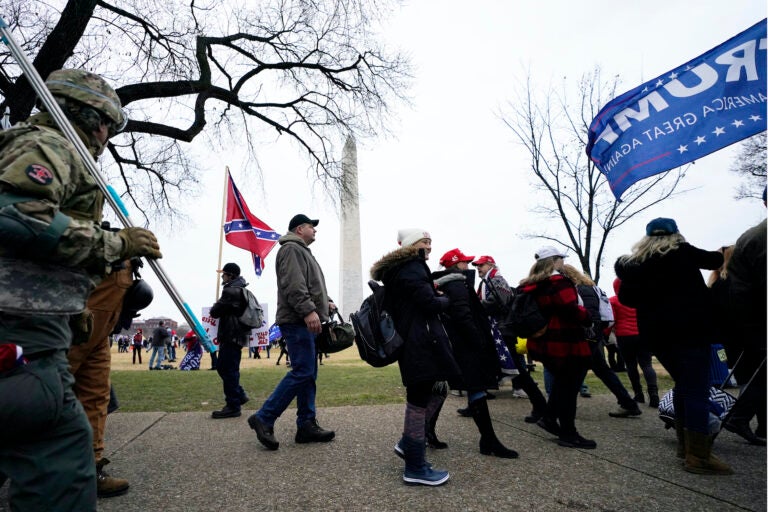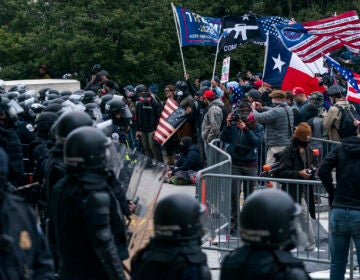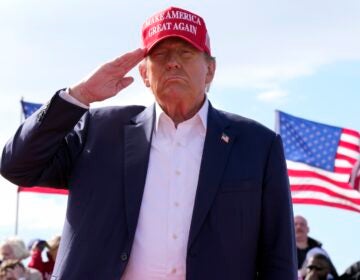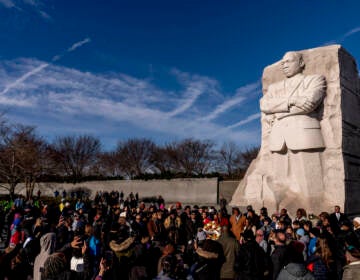Philly civil rights attorney: White supremacy attacked democracy after the 2020 election
Temple University professor and Philly civil rights attorney Timothy Welbeck spoke with WHYY's Annette John-Hall about white supremacy and the deadly U.S. Capitol siege.
Listen 4:27
In this Jan. 6, 2021, file photo, Trump supporters gather on the Washington Monument grounds in advance of a rally in Washington. (AP Photo/Julio Cortez)
After a mob of insurrectionists stormed the U.S.Capitol last week, many people including President-elect Joe Biden, proclaimed, “This is not who America is.”
But many Black people — subjected to generations of racial violence and systemic oppression — felt like what they saw wasn’t too far off from the America they know.
Civil rights attorney Timothy Welbeck talked to WHYY’s Annette John-Hall about the ways white supremacy has worked to maintain societal order throughout history and how it attacked democracy after the presidential election.
—
Professor Welbeck, after domestic terrorists stormed the U.S. Capitol last week, you heard a lot of the commentators say this isn’t America. You even heard President-elect Joe Biden say that the scenes of chaos at the Capitol do not reflect the true America. But a lot of people, especially Black people disagreed with that statement, saying, this is exactly who we are. Is this who we are?
Absolutely. The entirety of the American experiment has been based on the disenfranchisement of non-white people. When you look at our literature, history begins with the eradication of the indigenous people of this land, the enslavement of Black people from West Africa. And then every conceivable institution is built off of that framework. And when you look at every portion of American history where we’ve made gains towards easing some of the burdens of that oppression, we’ve seen some type of violent backlash to return us to the previous set of societal order.
How much of this was fueled by grievances about race and how much of it was fueled by white supremacy?
I would say the core of it is linked to white supremacy, just in the notion that the Black vote is illegitimate and that Black votes should be disenfranchised, and that the greater good of the country rests upon the whims and the desires of the white population. When you look at the key places that the president was fabricating this notion of voting fraud — primarily, predominantly Black populations. If you look at Atlanta, Philadelphia, Milwaukee, Detroit, these are places with some of the nation’s largest black populations.
And to that end, there is a reverend who’s also an organizer based in Detroit who was helping mobilize the vote in Detroit. His name is Steven Bland. He did an interview on MSNBC on the day of the election and he said we went from picking cotton to picking presidents.
And that notion there that we went from picking cotton to picking presidents, it cements the idea of what was happening at the Capitol last week, and that seeing black people in power to vote and select representatives and even hold elected office is a disruption to the societal order of much of our nation’s history. And many people feel like that’s an affront to this nation.
And so political pundits have framed it as economic anxiety. But economic anxiety doesn’t make you pick up a Confederate flag or wear Nazi emblems or get Nazi tattoos and call a black Capitol police officer the N-word. That’s not economic anxiety. That’s about people feeling the slipping of power that benefits them to the disadvantage of others.
How did Trump stoke the flames of this racism and this insurrection?
In the most immediate sense, he has been talking about the impropriety of the election since the day of. And so he engendered this idea within his followers that the election was illegitimate and came up with all of these erroneous theories and just baseless allegations. But beyond that much of his time as a public figure, he has stoked these flames of xenophobia, bigotry, and racism. His presidential campaign began with him declaring that Mexican immigrants were murderers and rapists and some he imagined were good people. I mean, that’s how he starts off.
Though his supporters were seeing what they felt like was a last stand to preserve this power that he had presented to them. And so whether it’s his rhetoric throughout the course of his presidency or the rhetoric immediately leading up to it, all of it was a contribution.
So getting back to what’s going to be happening next week with our new president, Joe Biden. After he won the presidency, one of the first things Biden said is that we need to heal as a nation. But what needs to take place before healing can happen or can it ever happen?
We need true accountability from all of those who participated in the great harm that was done to this nation. I understand President-elect Biden’s reflex to want to move past this moment and to bring in the disgruntled people from the right. But we can’t reconcile fully until there’s an acknowledgment of what happened and that there are also mechanisms in place to forestall the threat of violence that many of them are still bringing.
And then once we have that, once we at least have curtailed the violence to some degree and acknowledge the harm that is done, then we can discuss what it will take to make amends. But this idea of coming together to disregard what we just saw and pretend as though it didn’t happen is not going to benefit anyone.

Get daily updates from WHYY News!
WHYY is your source for fact-based, in-depth journalism and information. As a nonprofit organization, we rely on financial support from readers like you. Please give today.





